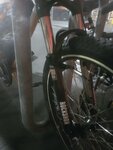That's correct.
Suspension on a cargobike that is designed from the ground up to be a dedicated full-suspension cargo bike, can work against the efficiency and create handling problems.
One of the biggest reason most urban bikes don't spec suspension is most MTB suspensions are designed for big hits (multiple inches). They also adjust the rebound accordingly.
Imperfections on the road are not like what you would find on a MTB track and these are small, high-frequency bumps that are better absorbed by a wider, cushy tire.
Also, shocks don't work too well in very cold conditions and require routine maintenance.
If you are carrying 300lbs of rider+ cargo, immediate braking would give a sense of diving effect which isn't very confidence inspiring for a rider. Tuning this rebound for varying load can be a challenge as mentioned above.
Xtracyle is a dedicated cargo bike manufacturer and there a reason why they don't use shocks on their bikes:
https://www.xtracycle.com/product/edgerunner/






